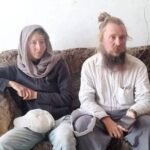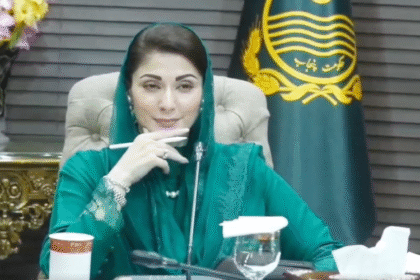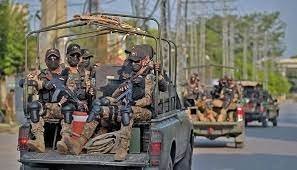News Desk
In a historic and dramatic turn of events, South Korean President Yoon Suk-yeol was arrested on Wednesday following an unsuccessful attempt to impose martial law in the country, marking the first time a sitting South Korean president has been detained on charges of treason. The arrest came after weeks of tense investigations into corruption and abuse of power, culminating in a high-stakes raid on the presidential residence by hundreds of police officers and investigators.
According to international news agency AFP, President Yoon Suk-yeol, who faced accusations of attempting to enforce a short-lived martial law last month, became the first sitting president in South Korean history to be arrested. The operation was carried out by the Corruption Investigation Office (CIO), which had been investigating allegations against Yoon for several weeks. Hundreds of law enforcement officers arrived at the president’s residence early on Wednesday, some even scaling walls and using back paths to reach the main building.
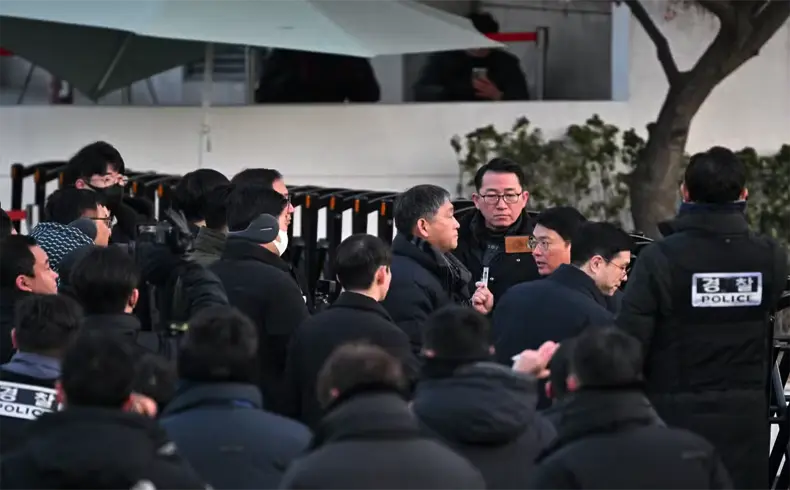
This arrest was the second attempt by authorities to apprehend Yoon. The first attempt took place on January 3, when tensions between Yoon’s security service (PSS) and investigators led to a standoff that lasted several hours. Despite the resistance, where security personnel blocked the implementation of the arrest warrant, no action was taken at the time.
However, Yoon’s lawyer, Seok Dong-hyun, stated that the president agreed to cooperate with the investigation and decided to leave his residence to avoid any escalation of the situation. Seok confirmed on Facebook that Yoon had planned to personally appear before the Corruption Investigation Office. Shortly afterward, investigators announced that Yoon had been arrested.
The Joint Investigation Headquarters issued a statement confirming that the arrest warrant for Yoon was officially executed at 10:33 AM on January 15. Prior to the arrest, AFP reporters observed brief clashes at the gate of the residence, where Yoon’s supporters had gathered to protect him. Members of Yoon’s ruling People Power Party also arrived at the scene in his defense. Protesters could be heard chanting slogans against the “illegal warrant” while waving South Korean and U.S. flags. Some even lay down in front of the main entrance to the residence.
According to local news reports, the standoff escalated, with police and CIO officers forcibly removing Yoon’s supporters from the premises. Around 30 lawmakers from Yoon’s People Power Party attempted to obstruct the investigation, urging officials to halt the operation. The president’s security forces had set up barbed wire and barricades around the residence, which opposition figures referred to as a “fortress.”
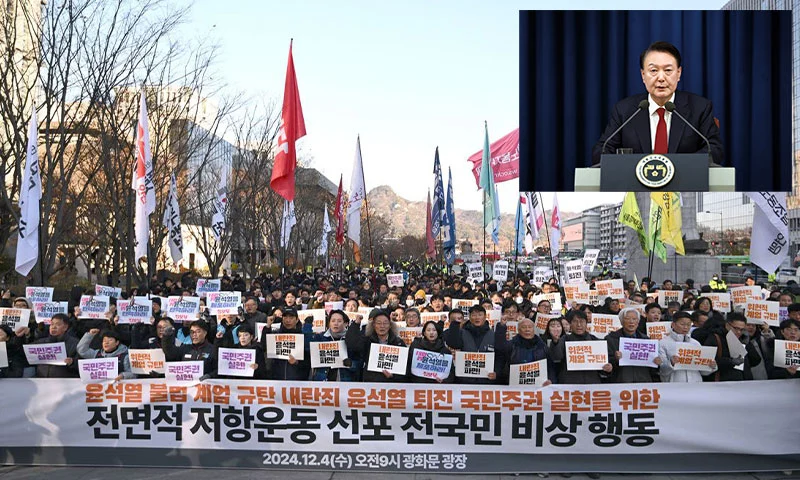
Due to the heightened tensions, local media reported that the police had decided to proceed with the operation wearing bulletproof vests rather than carrying firearms. After the arrest, Yoon can be held for up to 48 hours under the current arrest warrant. However, investigators may need to apply for an additional warrant to extend his detention. Yoon’s legal team has repeatedly called the arrest warrant illegal, claiming it lacked proper legal grounds.
In a related legal development, impeachment proceedings against Yoon began on Tuesday with a brief hearing. However, Yoon chose not to attend, citing alleged security concerns, which delayed the process. Despite his absence, the impeachment hearing will proceed, with the next session scheduled for the following day.
The arrest and investigation stem from Yoon’s attempt to impose martial law in December after accusing opposition parties of engaging in anti-state activities. The president declared a state of emergency, with plans to implement martial law, alleging that certain political factions were undermining the country’s democratic system. However, his move was immediately challenged in the National Assembly, where lawmakers quickly passed a resolution rejecting the martial law declaration.
In a televised address, President Yoon defended his actions, arguing that martial law was necessary to “rebuild a free and democratic nation” and protect the constitution. He claimed that opposition parties had taken control of the parliamentary process and used it to drive the country into crisis. Yoon argued that, with increasing threats from North Korea and internal forces working against the state, there was no choice but to take decisive action.
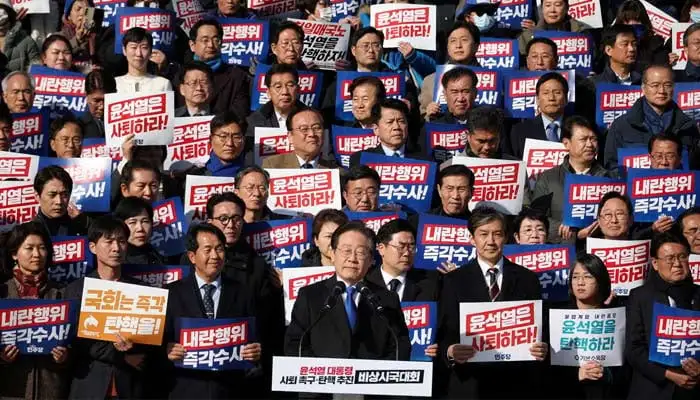
Despite Yoon’s justification, the National Assembly swiftly voted to annul his martial law decree, with 190 lawmakers voting against the president’s actions. Following the parliamentary vote, the military units stationed in response to the martial law order withdrew, and the resolution was deemed final.
Yoon’s decision to impose martial law marked a dramatic escalation in his ongoing conflict with opposition groups in the legislature. Since taking office in 2022, Yoon has struggled to push forward his legislative agenda against a parliament controlled by the opposition Democratic Party, which holds a significant majority. This division has led to frequent clashes, with accusations of obstructionism and undermining the democratic process.
In his defense, President Yoon repeatedly framed the opposition’s actions as a threat to the country’s stability. He specifically accused opposition lawmakers of using their parliamentary majority to block key government policies and prevent the passage of important bills, including a budget proposal and judicial reforms. The political gridlock, Yoon claimed, endangered the country’s economic recovery and national security.
The failed martial law attempt has sparked a broader debate about the state of South Korean democracy and the limits of presidential power. Critics have pointed to Yoon’s actions as an authoritarian overreach, echoing concerns about the erosion of democratic norms and institutions. His critics argue that his actions mirrored tactics used by previous authoritarian regimes in South Korea, which have long been a sensitive subject in the country’s political history.
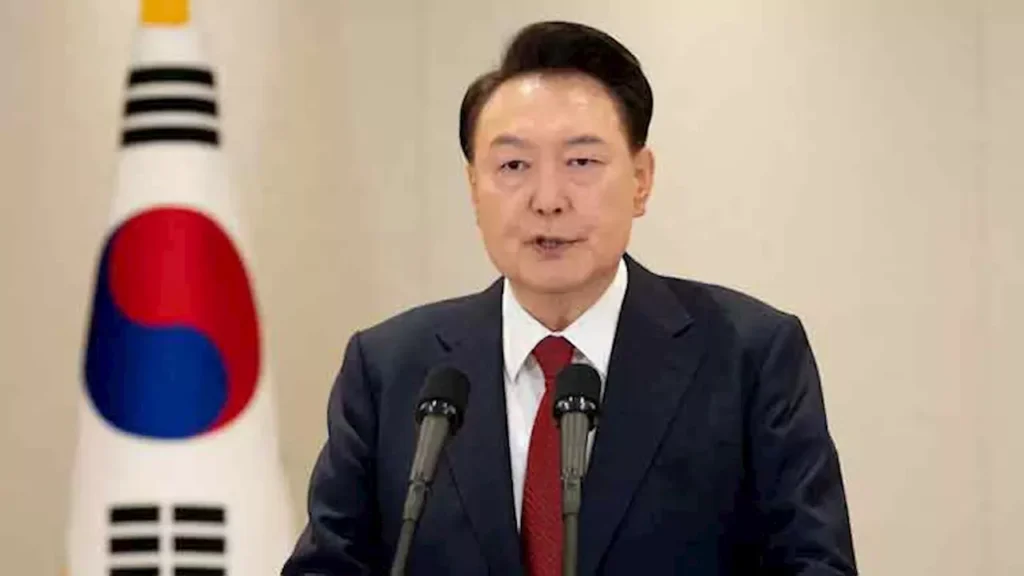
Following the collapse of the martial law order, Yoon’s political opponents have seized the opportunity to push for impeachment, arguing that the president’s attempt to override the democratic process constituted a breach of his constitutional duties. The impeachment process, while still in its early stages, has the potential to further destabilize the country’s political landscape, especially if it leads to a full trial and removal from office.
The international community has closely watched these developments, with many analysts questioning the implications for South Korea’s political future. The situation could have far-reaching consequences for the country’s relationship with both the United States and North Korea, given the geopolitical tensions on the Korean Peninsula. The United States, as a key ally of South Korea, has expressed concern over the political instability, while North Korea has continued to pose a significant security threat in the region.
As of now, South Korea finds itself at a critical juncture. The country’s democratic institutions are being tested, with the outcome of the impeachment proceedings and ongoing investigations likely to determine the future of Yoon’s presidency. For now, the nation faces the prospect of continued political upheaval, with the next few weeks set to be a decisive moment in South Korea’s political history.
In conclusion, the arrest of President Yoon Suk-yeol marks the beginning of a complex legal and political battle that will define the course of South Korea’s future. As investigations and impeachment proceedings unfold, the question remains: can South Korea’s democratic institutions withstand the pressures of this unprecedented political crisis? The coming days and weeks will be crucial in determining the fate of the country’s leadership and its democratic system.
Source: The COW News



